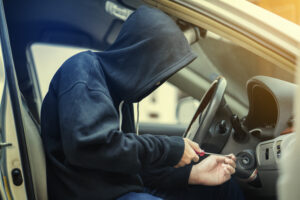 Certain 2011 to 2021 Kia and 2015 to 2021 Hyundai vehicles were designed, manufactured, and sold without an electronic immobilizer found in over 95% of other vehicles. As such, these automobiles are prone to theft. Thieves typically break a back window to avoid alarms, expose the steering column, and fit a USB-A plug into the ignition. Turning the plug with an inserted cable starts the car because the cars lack an engine immobilizer that prevents the engine from starting without a paired key. After months of thefts that have led to at least eight deaths, car makers Hyundai and Kia are offering free software updates to roughly 8.3 million cars that can be stolen with the aid of a USB-A cable.
Certain 2011 to 2021 Kia and 2015 to 2021 Hyundai vehicles were designed, manufactured, and sold without an electronic immobilizer found in over 95% of other vehicles. As such, these automobiles are prone to theft. Thieves typically break a back window to avoid alarms, expose the steering column, and fit a USB-A plug into the ignition. Turning the plug with an inserted cable starts the car because the cars lack an engine immobilizer that prevents the engine from starting without a paired key. After months of thefts that have led to at least eight deaths, car makers Hyundai and Kia are offering free software updates to roughly 8.3 million cars that can be stolen with the aid of a USB-A cable.
The rate of thefts multiplied after a group of thieves in Milwaukee became famous for posting a video entitled “The Kia Challenge” about their crimes using the hashtag “#kiaboys. The Kia Boys” steal vehicles and joy ride them in a dangerous manner, often damaging the vehicle and other property. After “Kia Boys” videos went viral on TikTok and videos were uploaded to YouTube explaining how easy it is to steal Kia and Hyundai vehicles, car thefts exploded, with some cities seeing a nearly 1000% increase in thefts over the past few years. Kia and Hyundai vehicle thefts are about to surpass that of all other vehicles combined. The City of Madison Wisconsin issued a press release last summer confirming that the theft of Kia and Hyundai vehicles soared 270% in that year alone, with more than half between July and August. Similarly, The City of Minneapolis recorded an 836% increase in car thefts, with over 40% of all stolen vehicles being Kia and Hyundai. Chicago has witnessed a similar 767% increase in vehicle theft.
According to a Highway Loss Data Institute Report, in 2015, 96% of vehicles in the U.S. had immobilizers, but only 26% of Kia and Hyundai vehicles. The technology was not new and was both economically and technologically feasible. Moreover, Kia and Hyundai both know that immobilizers drastically reduce the risk of theft. Nonetheless, they made the decision to save money and sell cars to unsuspecting consumers without immobilizers. In fact, Canada, the European Union, and many other countries mandate the use of immobilizers in all vehicles. Kia and Hyundai have not “recalled” these vehicles, and they insist they are not defective. But in February 2023 they released a “software update” to affected vehicles intended to “kill” the ability to start the car without the key fob in proximity.
This phenomenon has dire consequences for our insurance clients. Many states are instructing insurance companies that, under state law, they may not deny coverage to owners of these vehicles. Regulatory agencies see no legitimate business or economic purpose for rendering all or any subset of Hyundai and Kia vehicles as wholly ineligible for motor vehicle liability coverage. But many other Kia and Hyundai owners are being rejected for insurance coverage, leaving them with a vehicle that cannot be driven. Two of the states that have been hardest by the spike in thefts are Colorado and Missouri. Now, reports from each state indicate that major insurance companies are flat-out refusing to provide coverage if the customer in question has a vulnerable Kia or Hyundai model.
Our clients’ insureds have filed claims due to vehicles being stolen, being damaged, for loss of use, for diminution in value, and for increased insurance premiums. Kia and Hyundai are offering software upgrades to 8.3 million vehicles, but it is too little, too late. This phenomenon has cost our clients untold tens of millions of dollars and MWL is positioning itself to file suit on behalf of numerous insurance carries around the nation imminently. If you would like to be included, there is still time, but we need some initial, limited information to include you with our filing. Whether the damage is to the vehicle, to a person, or to other property, you have a viable claim, and we are ready to purse on your behalf. Please contact Ashton Kirsch at akirsch@mwl-law.com or Rich Schuster at rschuster@mwl-law.com to discuss next steps and how you can join our group in holding Kia and Hyundai responsible for their irresponsible actions.
Ashton T. Kirsch is an insurance litigation attorney and shareholder with the law firm of Matthiesen, Wickert & Lehrer, S.C. Ashton has been with MWL’s Hartford office since 2015, concentrating his practice on litigation of subrogation cases involving large loss casualty, commercial auto, transportation and cargo, and workers’ compensation. He has built and grown the MWL commercial auto and cargo/transportation group into the thriving sector of our firm’s subrogation practice.
Richard A. Schuster 蘇世達, is a trial lawyer and shareholder with the law firm of Matthiesen, Wickert & Lehrer, S.C. Richard helps companies litigate product liability, property, and commercial disputes throughout the United States. He also helps companies navigate the supply chain, regulatory, and other challenges they face doing business in the United States, particularly as they rapidly grow.






